
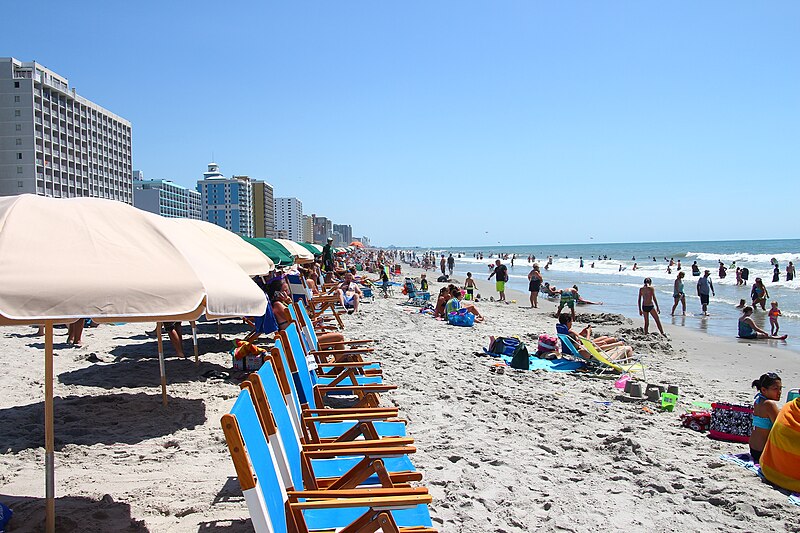
Summer 2018
There should be more opportunities in the world for people, but we must advocate more than just opportunity. We must advocate in this 21st century outright equality. That equality means that we are entitled to freedom, justice, and equality by birthright. It means that we are entitled to health care as a human right. It means that all human beings are entitled to housing. These words are beyond just liberalism. It involves revolutionary ideological truisms. These legitimate aims are against the old school conservative view that the free market can free everyone since history teaches us that the market is imperfect. For example, it takes more than the free market alone to end pollution and to increase the social safety net. There needs to be public intervention. We have to oppose an unjust hierarchy which rewards human economic exploitation at the expense of the poor and of the working class. We don't live in a meritocracy because of the discriminatory system that harms the lives of many black people, other people of color, women, the poor, immigrants, Muslims, refugees, undocumented human beings, and other human beings. Divide and conquer systems among workers has been used by capitalist elites in hoarding more wealth among themselves while maintaining oligarchy instead of economic justice. The evil of capitalist exploitation is complicit in environmental degradation, labor exploitation, and other evils. These policies are not just executed by the GOP (which we already know from Reaganomics to the tax cuts for the wealthy). Even some compromising Democrats follow Third Way neoliberalism which wants massive deregulation, privatization, austerity, corporate trade, bank bailouts, and other nefarious aims. That is why the polls have shown a majority of Americans endorsing the following: universal health care, free college, a living wage, the mass expansion of the public sector, the universalization of resources and industries, and democratic controls on big finance and the free flow of capital. Therefore, the truth is on our side. So, we will keep on fighting the good fight.
Also, we can never forget that we live in class struggle too. In this century, we have record economic inequality. It is no secret that the financial oligarchy has the system in place where millions of America work sometimes 2-3 jobs just to get a middle class paycheck in total. Then, you have large homelessness in NYC and in LA. You have social programs being cut massively in Wisconsin and in other locations. Many politicians advocate work requirements on Medicaid and SNAP which harm the most vulnerable economically of our society. Some extremists want massive child labor in America. Predatory capitalism solves nothing. History has proven that the only solution is social activism and political agitation in getting living wages, collective bargaining, the improvement of farms (as farms in the States contribute heavily to economic growth), the growth of the social safety net, and other investments to grow our infrastructure. Also, it is important to note that Rosa Parks was a Revolutionary. She was involved in the anti-war movement, the anti-apartheid movement, a supporter of Malcolm X including Dr. King, and opposed the prison industrial complex. So, her legacy ought to be honored completely.
What are my views of Kanye West and Candice Owens supporting Donald Trump? My views are the same. Both people are deciding to support a male who uses vicious language against women, minorities, and fighters against racial injustice. They voluntarily agree with a male who wants peaceful protesters in the NFL to be fired and has advocated for violence against dissenters in his rallies. They have aligned with a person who made the racist comment that one's ethnicity determines whether he or she is biased in judging a case. Nothing is new under the sun. People like Jim Brown, Ray Lewis, and Omarosa Onee Manigault-Newman (who later disagrees with Trump after she was fired from the White House recently) have supported Trump when he is the antithesis of progressive liberation. Therefore, we shouldn't disrespect Kanye West or Candice Owens in an unfair fashion.
They are still black people in pain and in ideological confusion because of the circumstances of society. Likewise, we don't have to agree with their pro-Trump rhetoric at all. We do have the right to disagree with them. Candice is wrong to equate Democrats to a plantation. That trivializes and mocks the experiences of black people in slavery. A political party is not equivalent to black slaves in a plantation suffering rape, violent abuse, emotional abuse, religious deception, and total tyranny. She or Candice is wrong to say that Trump is the savior of the world. Trump a'int no savior of mine. God is my Savior. She is wrong to assume that people like me (I'm a black person) should vote for Republicans when the GOP leadership has been complicit in the war on drugs, austerity, and other evil policies. I'm a progressive on economic issues, so I can't vote for a Republican whose many leaders agree with bigotry instead of tolerance and in radically reactionary positions on issues. Social justice, government intervention to help unions, a strong social safety net, workers' rights, and environmental protections are always sacrosanct values that we all support. She and Kanye omits that black people are oppressed by an evil system and wishing it away isn't going to solve this problem. Solving this problem revolves around unity, programs, action, and preparation for resistance against racism/discrimination. People have the right to believe in what they want. Trump and his allies like Pence, Jim Kelly, and Kelly Sadler are the antithesis of free thinking. I have the right to disagree with both Kanye and Candice Owens in a rational fashion.


Today is the historic anniversary of D-Day from 1944. It represented the beginning of the end of World War II. The heroic Allied forces came into Normandy, France in order for them to defeat the fascist Nazis. It was the largest naval amphibious invasion in human history. It involved Americans, the British human beings, Canadians, and other human beings of diverse nationalities. Its code-name was Operation Overlord and it was heavily influenced by General Dwight D. Eisenhower.
The ships came on the shore of the beaches and divided themselves into different sections in order for the soldiers to defeat the Nazi forces. The target 50-mile (80 km) stretch of the Normandy coast was divided into five sectors: Utah, Omaha, Gold, Juno, and Sword. Before the invasion, the Allies manipulated the Nazis, so the fascists could realize the Allies' complete locations. Also, 24,000 soldiers came upon the beaches. Gunfire was everywhere. Thousands of people died in one day alone. A lot of sacrifice transpired, so the world can be free from Nazi tyranny. Yes, there were African Americans who were involved in the D-Day operation. There was an African-American combat unit. The men of the 320th Barrage Balloon Battalion were packed tight with infantry troops and soon fought during D-Day. Some of the men names were George Davison, Waverly Bernard "Woody" Woodson, Jr., etc.

Black people fought in every war of American history. Veterans in general have been some of the most revolutionary people of our country. One example is how some of the greatest anti-Vietnam War protesters were veterans. The leaders of the Bonus March which wanted economic justice for WWI veterans were veterans. One veteran inspired Colin Kaepernick to kneel in protest of racial injustice and police brutality. Veterans today still motivate us in positive ways. Today, we know that fascism has not ended. Therefore, we are always committed to not only advance democratic values, but to live our lives in fidelity to honor and altruism. The struggle continues and the courageous heroes from yesteryear inspire us in our time, so social justice can be made into a reality.
Recently, Paul Ryan has officially retired during this year. He is a person who wants to spent time to his family. He is a well known man who not only supported Donald Trump. He has supported the GOP agenda of Ayn Rand economics, far right extremism, and other Tea Party positions. He is the person who faithfully advanced austerity policies which crippled legitimate social programs from the poor and working class human beings. Paul Ryan loved the disgraceful GOP tax bill that expands economic inequality. People know what works. What works involve investments in our infrastructure, increased taxes for the super wealthy, international cooperation, the protection of our civil liberties, union rights (including collective bargaining), a stronger social safety net, a living wage, expansion of health care services, and policies to abolish racism & discrimination. So, people like Ryan want to crush the New Deal, but they have failed. There could be a blue wave by the midterms in November of 2018. We shall see. Our justice advocacy remains.
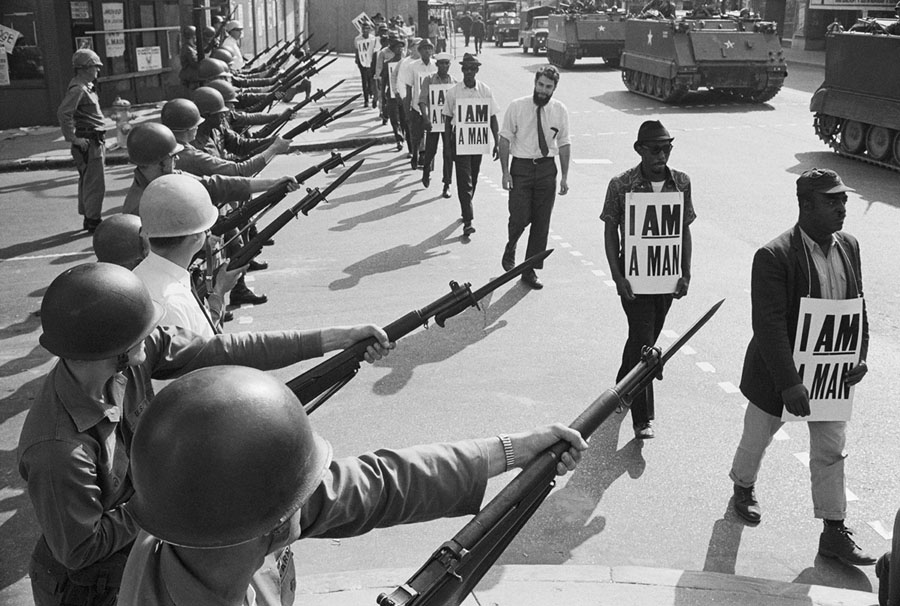

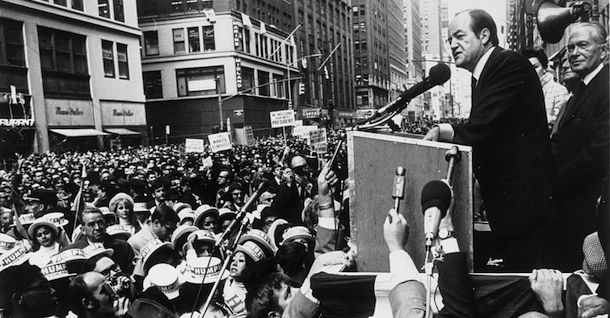
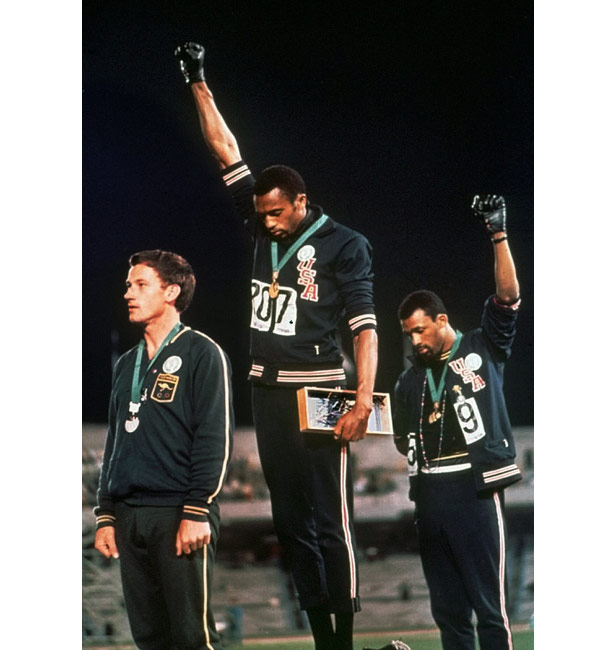
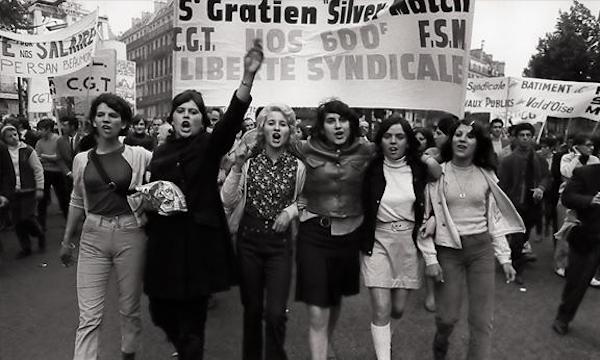
1968
It was time of of monumental triumphs and tragedies that simultaneously existed. Back then, I wasn't born yet, but my parents were still alive and much younger than 30 years of age during the year of 1968. This year was one of the most important, powerful years in human history. 1968 was a year that transformed the United States of America and the world forever. Political campaigns being abundant, soldiers were fighting in the Vietnamese peninsula (with events like the Tet Offensive and the Battle of Khe Sanh), and other people exploring tactics for freedom dominated the social atmosphere. The hippie movement flourished and the Black Power Movement started to accumulate into its zenith. Wars, Cold War tensions, the space race, civil rights, women's rights activism, Native American political growth, Latinx social activism, and other social movements existed during that age too. Tons of human beings advanced in the streets to protest in anti-war rallies. Civil rights occurrences continued to develop, college campus events promoted progressive causes, and anti-Stalinist activists fought for justice in Prague. Some of the greatest world leaders for social change (like Dr. Martin Luther King Jr. and Robert Kennedy) were viciously assassinated in 1968. Progressives saw many of their legitimate policies opposed by the reactionary, right wing backlash (which Nixon exploited in order for him to be elected President by the end of 1968. Not to mention that George Wallace's Presidential campaign of 1968 appealed to xenophobia and bigotry too). The police terrorist violence during the Democratic National Convention in Chicago also revealed the numerous divisions found in the Democratic Party. The audience to that Convention saw the New Deal Coalition divided and ruined before their very eyes. Additionally, 1968 once again detailed the horrendous reality of police brutality. Journalists, protesters, and other bystanders were arrested and callously assaulted by many reckless, violent police officers during the Chicago 1968 Democratic National Convention. Ronald Reagan, by 1968, was part of the right wing extremism clique as well. Ironically, Reagan was once a pro-FDR New Deal Democrat. By the 1950's, Ronald Reagan became one of the most conservative politicians of the post-WWII era.
Uncertainty, revolts against established orders, and continued fights for justice for all (like Tommie Smith and John Carlos showing their black fists in the air during the 1968 Mexico Olympics) all encompass the firmament of the year of 1968. 1968 has presented the world with a picture of the best and the worst of humanity. It involved human beings who rightfully desired black people to have absolute equality (like Ella Baker, Fred Hampton, Dr. Martin Luther King Jr., Maya Angelou, Septima Clark, Ossie Davis, Ruby Dee, Muhammad Ali, and other heroes), women to have real freedom, the environment to be protected, and the Vietnam War to completely end. Many came together to attempt to end poverty via the Poor People's Campaign. Sister Shirley Chisholm became the first African American woman in the U.S. Congress, which was excellent news. Conversely, other folks were exponents of the evils of imperialism, bigotry, and the status quo. 50 years later, change has come about among many avenues, but we still have a long way to go.
Presently, the war on terror and threats of war (by the current occupant of the White White against North Korea in blunt terms until recently when he wants a sit down with North Korea) in the Korean peninsula exist. Furthermore, more social activism for real change has commenced in our generation from Black Lives Matter, the Dream Defenders, and to the widespread Resistance movement. Now, it is the time to evaluate 1968 in all of its intricate complexities, its profound tragedies, and its iconic, historic events. I will show three parts of this work on 1968 too. This first part will show occurrences from January 1st, 1968 to the assassination of the late Dr. Martin Luther King Jr. The second part is from Dr. King's assassination to the assassination of New York Senator and Presidential candidate Robert Francis Kennedy. The final part will be from the assassination of Robert Kennedy to the end of 1968. Justice is always our aim and we believe in the Dream unconditionally.
Yes, we still Rise.


The Genesis
The year of 1968 dealt with the issues of civil rights, gender equality, the Vietnam War, environmental issues, student movements, technology including the space race, and the counterculture. By January 14, 1968, the Green Bay Packers won Super Bowl II. The coach of the Packers was the well-known progressive Vince Lombardi. By January 15, 1968, Jeannette Rankin led anti-war protest in Washington, D.C. She was a Congresswoman from Montana. The motto as it relates to this movement involved “Sisterhood is Powerful.” She worked with women among many colors, political differences, class differences, etc. to seek an end to the Vietnam War. President Lyndon Johnson gave his State of the Union address on January 17, 1968. His speech was a combination of trying to promote his successful policies, but he was overtly dismayed at criticism of his disastrous policies in the Vietnam War. LBJ knew that the U.S. was not close to ending the Vietnam War in private, but he gave more rosy public face via his Congressional State of the Union address in order to politically maintain his inflexible position (while General Westmoreland constantly expressed the deception that the light was at the end of the tunnel or American victory was imminent). The speech failed to promote more unity in the American electorate as America back in 1968 was heavily divided on many social and foreign policy issues. In essence, his speech was a prelude to the explosion of events that would transpire throughout the year of 1968. On January 17, 1968, LBJ called for the non-conversation of the U.S. dollar. 2 days later, Eartha Kitt was at a White House conference. It talked about crime and the recent rebellions that came about. Eartha Kitt was not having a token discussion on crime. She courageously spoke up and opposed the Vietnam War. She said that people are suffering in the world and the Vietnam War must be addressed. Eartha Kitt wanted black and poor children to be respected of their dignity without exploitation. She said these words to the First Lady whose name was Lady Bird Johnson. Immediately, the FBI and the CIA monitored her and she was shunned by the establishment via a slander campaign for years. Eartha Kitt suffered unjustly, but she was a strong black woman who overcame the adversity. By the late 1970's, she started her huge comeback involving theater and acting in general.
Kareem Abdul-Jabbar and the rest of the UCLA team played against Elvin Hayes and his University of Houston players on January 20, 1968. The game was very significant in the history of basketball. The University of Houston won 71-69 in the first NCAA basketball game to be televised in a national audience. This was before March Madness. The Battle of Khe Sanh started on January 21, 1968 and it lasted to July 9, 1968 (when U.S. forces withdrew from the battle area). The battle was indecisive as both sides claimed victory (because Americans claimed that they just withdraw from the Khe Sanh base to destroy it as it wasn’t militarily necessary to defend, and the Vietnamese claimed that it ruled the area after the Americans left). It occurred on the area of northwestern Quang Tri Province in Southern Vietnam. U.S. forces defended Khe Sanh Combat Base by the U.S. Marines, the U.S. Army, and the U.S. Air Force. Many South Vietnamese Army forces or the ARVN fought in the battle too. In January of 1968, tons of music existed from soul, R&B, rock and roll, gospel, blues, jazz, etc. In that month, the Beatles were popular, Johnny Cash released music, and Steppenwolf was popular. Rowan & Martin’s Laugh-In debuted on NBC on January 22, 1968. It was a famous sketch comedy show which ended by March 12, 1973. North Korea on the next day seized the USS Pueblo claiming that the ship violated its territorial waters while spying. This was an international incident. It had a crew of 83 people. One person from America was killed. This came a more than a week after President Lyndon Johnson gave his State of the Union address to the United States Congress. The crew of the Pueblo was taken to Wonsan and moved twice to POW or prisoner of war camps. The crew said that they were starved and tortured while in North Korean custody. There were negotiations for their release. The U.S. talked with South Koreans involving negotiations too.
South Koreans were angry at being left out in the negotiations. The crew was released after the U.S. apologized, admitted it was spying via the Pueblo, and the promise that the U.S. won’t use spying in the future. This was done so the people could be released. LBJ refused to attack North Korea since he feared that the crew would be killed if he would have done that. They were released by December 23, 1968 (in Panmunjom at the DMZ). The Soviets opposed North Korea’s actions while the Chinese supported it. On February 11, 1968, Madison Square Garden in New York City opened. By February 13, 1968, civil rights events happened at University of Wisconsin-Madison and the University of North Carolina at Chapel Hill. February 27, 1968 was when Walter Cronkite said that the war was a stalemate and the U.S. must withdrawal in a negotiated settlement. From March 1-8, 1968, about 15,000 Latino students walked outside of LA schools in demanding for better education. The government of Czechoslovakia banned censorship on March 5, 1968. 500 New York University students picket a university sponsored recruiting event for Dow Chemical Company on March 6. Dow manufactured napalm which has burned the flesh of Vietnamese men, women, and children. There are pictures showing Vietnamese children running away from napalm bombings. On March of 1968, Otis Redding's posthumous single "(Sittin' On) The Dock of The Bay" goes to #1 US and #3 UK.
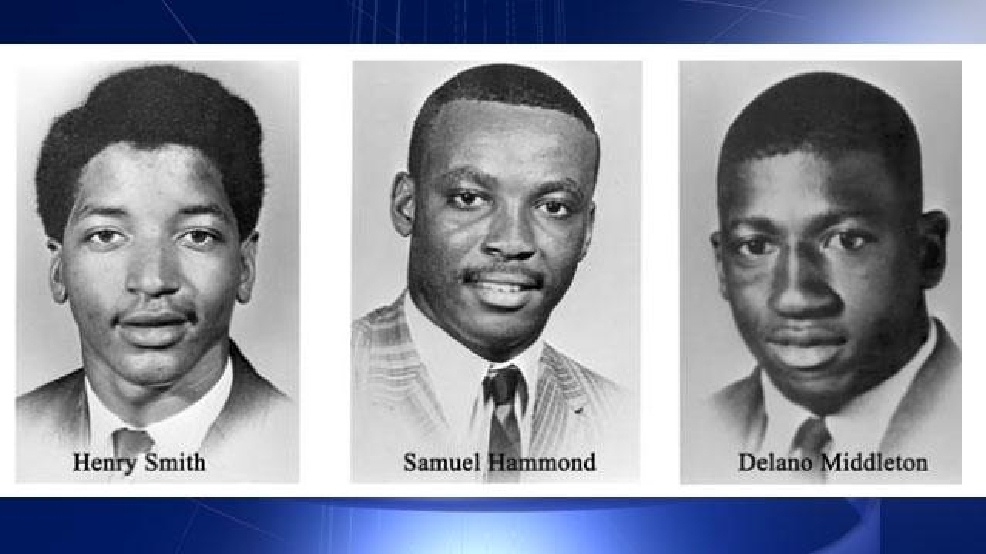

The Fight for Civil Rights
One of the biggest tragedies in 1968 was the Orangeburg Massacre in South Carolina (which was before the 1970 Kent State shootings and the Jackson State killings). It took place in Orangeburg, South Carolina at South Carolina State University. The situation was about black students opposing the segregation of black patrons at the All Star Bowling lane (who was owned by Harry K. Floyd). They or African American young human beings gathered at February 6, 1968 to protest and desire the end of Jim Crow policies. Nothing happened. During the next night, many of the students returned. They protested, but the police arrested 15 people. The third night was in February 8th, 1968. The tensions were high because of the arrests during the previous night. The students were on the South Carolina State University campus instead of the bowling alley. A bonfire was built. The police tried to put it out. One cop was injured by a piece of banister thrown from the crowd. Then, the highway patrolman overreacted and fired his gun into the air. He wanted to calm the crowd. Other officers thought that they were fired upon, which wasn't the case at all. The officers fired into the crowd of students. Many students were murdered. Two of them were South Carolina State University students. Their names are Samuel Hammond and Henry Smith. Delano Middleton was killed and he was a high school student. 27 more students were wounded.
The cops used shotguns and buckshot when they fired in the crowd. Many victims were shot in their back and on the soles of their feet. Nine officers killed people and they were charged with excessive force at a campus protest. Of course, back then, they were never convicted which was a disgrace. One person was in placed into prison whose name was Cleveland Sellers or a member of SNCC (or the Student Nonviolent Coordinating Committee). He was convicted of inciting the riot, which was ludicrous. Cleveland Sellers served seven months in prison. Sellers was pardoned 25 years later after his conviction. Then-Governor Governor Robert E. McNair said that this was "one of the saddest days in the history of South Carolina." He's right on that point. He or McNair was wrong to blame Black Power protests for the violence when the killers of students were the cops. Sellers would go on to be the director of the University of South Carolina's African American Studies Program and President of Voorchees College. He wrote his autobiography, "The River of No Return." Sellers wrote that, “In spite of sometimes overwhelming odds, I never really strayed from my principles and loyalties. I have developed patience and constantly renew my dedication to the creation of a more humane world.” His son is the famous political leader Bakari T. Sellers. We remember the events of Orangeburg, South Carolina as a way for us to continue in our quest for justice for our people.

War and our Urban Areas
Today is the 50th year anniversary of the Tet Offensive. This was when Vietnamese forces attacked the U.S. Embassy in Saigon and other places throughout Vietnam. Many people died. American forces were taken by surprise. Back then, many American people thought the the U.S. had a near victory in the Vietnam War. U.S. soldiers in Vietnam dramatically increased from about 14,000 in 1964 to about 500,000 by the end of 1967. More than 2 billion tons of bombs were dropped in the area along with thousands of Americans who died from the tragic conflict.
Tet was the Vietnamese lunar new year, so many people in Vietnam were in a celebratory mood. On the evening of January 30, 1968, many North Vietnamese military forces disguised themselves as civilians or South Vietnamese troops. They did this in order to infiltrate South Vietnam locations and commence with an all out military assault around locations throughout the peninsula. Many of the North Vietnamese forces hid their weapons in baskets and vegetable carts. Some of these forces hid weapons in coffins too during the holiday of Tet Mau Than.
During the night of January 30, the attack started. 19 V.C. forces left a car and a van with anti-tank rockets and weapons to fire at the U.S. embassy compound in Saigon. A VC squadron destroyed a hole in the wall surrounding the U.S. embassy in Saigon. They rushed the courtyard of the compound. They couldn't go over the embassy's wall and door since it was heavily fortified. So, they pounded the building with rockets. They exchanged gunfire with the military police. That advance lasted for more than six hours. It took U.S. paratroopers (landed by helicopter on the embassy roof) to stop the North Vietnamese forces. North Vietnamese people fired with a machine gun across Thong Nhut Boulevard too. Walter Cronkite from CBS Evening News was shocked by the events. He said, "What the h___ is going on?...I thought we were winning the war." Then, North Vietnamese troops targeted every province and every city in South Vietnam. American planes were destroyed by the Communists. Days later, U.S. and South Vietnamese forces started to win the battle. The city of Hue was completely destroyed as it was one of the Communist holdouts. U.S., AVRN, and North Vietnamese causalities were large.


On February 1, 1968, the South Vietnamese General Nguyen Ngoc Loan captured an accused V.C. officer. Loan shot the person in the head in cold blood, which killed him without due process. The footage of the murder was shown on national TV. Before this act, Loan learned about North Vietnamese forces killing one of his senior officers along with the man's wife and six kids. This act of brutal murder was condemned worldwide. The photographer Eddie Adams recorded the image which has been shown across the globe. Adams was a friend of Loan and won the Pulitzer Prize for his image. Loan wasn't jailed for a war crime, but came into Virginia. He lived until 1998 when he was running a pizza parlor. After the Tet Offensive, more people realize that the war was a stalemate. LBJ knew of this and hid a lot of this information from the public for fear of being labeled as someone losing the war. The Tet Offensive established a new era of the war and ultimately the anti-war movement grew in power. The American forces won the Tet Offensive which included the massive bombing of the city of Hue. 33,000 North Vietnamese forces were killed along with 3,400 allied forces. The media showed the footage of Tet nationwide and skepticism by Americans about the Vietnam War increased. Many soldiers opposed the war and mutinies developed as well. Walter Cronkite called for a negotiated end to the Vietnam War and LBJ was reported to have said that if he lost Cronkite, he lost Middle America. From March 25-26, 1968, political establishment figures known as the "Wise Men" talked with LBJ about the Vietnam War. These men were participants of the Cold War and knew of the dire situation. The Wise men included Dean Acheson, former ambassador to Vietnam General Maxwell Taylor, former National Security advisor McGeorge Bundy, Supreme Court Justice Abe Fortas,and Democratic diplomat Averill Harriman. These were some of the architects of the war. Taylor and Bundy worked under the previous Kennedy administration. Even George Kennan, who was the founder of the U.S. containment Cold War policy, said that the Vietnam War was an error of policy. They decided that the Vietnam War policy that Johnson executed was futile and a de-escalation and negotiation (excluding an immediate withdrawal) was necessary. Johnson was disappointed and said that "the establishment bast___ bailed out." After Tet, the Vietnam War changed forever and LBJ soon would not run for President again. By this time, Dr. King was in opposition to the war. I was not born during that time, but my parents were alive back then. 1968 was a year of massive change and one of the most revolutionary years in human history.
It has been 50 years since the Kerner Commission report, which was released on February 28, 1968. This came about in the midst of rebellions in America from 1963 to 1968 (i.e. Philadelphia and Rochester had rebellions in 1964, we remember Watts in 1965, there was many rebellions in Cleveland and Chicago in 1966, and there were some in Newark plus Detroit in 1967. There were the others in 1968 after the King assassination). It was a time of massive changes in America. To understand the rebellions, we have to look at the time period back during the 1960’s. First, there was a post-World War II economic boom, but that expansion wasn’t enough to end poverty and oppression in America. That is why the New Frontier and the Great Society social programs existed as a means to address economic complications that transpired in American society. By the 1960’s, West Germany and Japan improved its economy (via help from the Allies from World War 2 ironically enough via the Marshall Plan, etc.). Both countries competed against America for cars, certain metal materials, and other resources. There was the Vietnam War which increased inflation and there was the massive deindustrialization of urban centers. This deindustrialization was part of jobs being stripped from the cities and placed into the suburbs and rural areas (for production) by corporate interests. Those, in the urban communities, especially among the poor, suffered a great deal of lax schools, lax wages, and desperation from a socioeconomic standpoint. Police misconduct triggered the many rebellions of the 1960’s as well.
The Kerner Commission report accurately mentioned that racism, economic exploitation, and segregation were contributing factors to the rebellions. Capitalistic exploitation continues to harm lives to this very day just like back in the day. People suffered overcrowded neighborhoods, substandard housing, and police harassment plus violence constantly. This commission was chaired by Illinois Democratic Governor Otto Kerner. The report was about 600 pages. It called for a solution that was far reaching. It wanted the creation of 2 million new jobs, 1 million would be created by direct government spending, 6 million housing units, and the expanding welfare system (to increase more people eligible for it). It wanted a guaranteed minimum income for all Americans and more funding for city schools equal to wealthier schools. Could you imagine someone proposing this wide ranging plan in 2018? That is taboo today, but many people even back then had the sense enough to realize accurately that large investments are necessary to help the poor and the oppressed. The sad part is that there has been no massive social or political reform in the federal level (on a massive scale) since the 1960’s except a handful of items. Medicare, Medicaid, the Civil Rights Act, and the Voting Rights Act all came about during the 1960’s. The imperialist war in Vietnam resulted in failure and it caused pressure on the dollar. Today, the majority of the wealth in America is owned by the wealthy few and the working class struggle for the basic of legitimate necessities. President Lyndon Baines Johnson refused to legislatively sign onto any provisions from the Kerner Commission even with its legitimate proposals. That is why we have to understand these realities in order for solutions to transpire.
On March 11, 1968, U.S. President Lyndon B. Johnson mandated that all computers purchases by the federal government support the ASCII character encoding. From November 1967 to early 1968, Eugene McCarthy's Presidential campaign was very powerful. Eugene McCarthy publicly announced his candidacy for the 1968 Presidential election on November 30, 1968 at the age of 51. Many of his supporters were middle class young people and college educated human beings. Some cut their hair to be "Clean for Gene." They traveled the nation, they used telephones to gain supporters, and they had enthusiasm. Eugene McCarthy was a liberal candidate, but many people believed that he had less of a charisma than a Robert Kennedy (who refused to run for President first. Back then, many initially criticized RFK for running for President late while McCarthy came about earlier to challenge LBJ). One volunteer in favor of Eugene McCarthy said the following, "There was the whole 'children's crusade' aspect, , with Gene as the father whom we would have like to have. Instead of having this warmonger redneck [LBJ], we had an educated, gentle man. Instead of an eagle, we had a dove." The New Hampshire primary of March 12, 1968 was historic. LBJ on won by a small margin to the antiwar candidate Eugene McCarthy (Nixon won 78 percent of the in the GOP New Hampshire primary). McCarthy had 42 percent of the Democratic vote while LBJ had 48 percent after the end of the New Hampshire primary. This showed the divisions in the country and in the Democratic Party over Vietnam. McCarthy first ran the race against Johnson on the issue of opposing the Vietnam War. The My Lai Massacre took place on March 16, 1968. It was about some American troops killing scores of Vietnamese civilians. It would only be made public by November in 1969.
On March 16, 1968, Senator Robert F. Kennedy announced publicly his candidacy for the race of the Democratic Party Presidential nomination. He won on the platform of ending the Vietnam War via a negotiation settlement, anti-pollution, gun control, decentralization of power, and racial plus social justice. Initially, some liberals criticized him for joining the race to late. Jacquline Kennedy feared that RFK would be assassinated like her late husband. Robert Kennedy continued onward. Robert Kennedy wasn't the same man who once worked with Joseph McCarthy. He was a more progressive man and Robert Kennedy did talk about uniting black people, white people, Latinx human beings, young, old, poor, and the more affluent in building a coalition to change America. There was a demonstration in London’s Grosvenor Square against the U.S. involvement in the Vietnam War. There was violence there as 91 people were injured and 200 demonstrators were arrested. The Congress ended the requirement for a gold reserve to back U.S. currency on March 18. Students at Howard University fight for black studies from March 19-23, 1968. They promoted a new era of student activism on college campuses. Students staged rallies, protests, and there was a 5 day sit in. They were at the administration building and shut down the university in protest over its ROTC program and the Vietnam War. They wanted a more progressive, Afrocentric curriculum. The movement in Howard University influenced the promotion of Black Studies, women’s studies, and other forms of studies nationwide to this very day.


Memphis Workers and Dr. King's Last Days
Today is the 50th Year Anniversary of the Memphis Sanitation strike (Memphis is in the South and many black people back then were restricted in land rights, educational opportunities, and other human rights). The sanitation workers' strike was about black men and black women uniting to fight for the right of sanitation workers to have unions, to have benefits, to have living wages, and to have other economic rights that they deserve. Many of the sanitation workers were sharecroppers in Jim Crow South. The struggle took many days. Many people protested, organized plans, used civil disobedience, etc. against the reactionary mayor Henry Loeb (who even resisted the workers from forming a public union). Baxter Leach was one surviving striker who loved what he did 50 years ago. Many of the strikers worked together in knowing each other's wives, children, and friends for the common cause of economic justice. More and more stories about the wives of the strikers are coming to light in order for the world to know that black women have always had a leadership role in the black freedom movement in general. You can't love black people without loving black women. It is as simple as that. About 1300 men were involved in the sanitation strikes and these men's wives also participated in the strikes as well. Jimmie Leach was the wife of Baxter Leach. Helen Turner was the wife of Alvin Turner. Helen Turner said that she passed out literature and did other heroic actions to support the human rights of sanitation workers. Beverly Turner applauded her mother's strength and her mother is Helen Turner. Dorothy McGowan is the daughter of Dorothy Pointdexter who told her story about the time too. Florence Ueal was the wife of the striker Ozell Ueal. Florence said that when someone puts her husband down, it is like putting her down too. The wives worked in various jobs too like being maids. Michael Leach is the son of Jimmie Leach and Michael talked about struggling to find food and other supplies. Lillie Philips Lee is the daughter of Savannah Phillips (who is the wife of the one of the striking workers). Lillie talked about the struggles that her family experience decades ago. The wives supported their husbands 100 percent. The organization of WOMEN was formed standing for Women on the Movement for Equality Now. This group was made up of women who wanted sanitation workers to have economic justice. It included many wives of the striking workers too.
Also, Dr. King was there to give solidarity with the workers and he advocated a boycott, civil disobedience, and other acts of resistance against the power structure. During this era of the late 1960's, Dr. Martin Luther King Jr. was heavily unpopular in America. The far right with anti-Communist extremists and the FBI (with Hoover and William Sullivan) falsely accused him of being a Communist. The FBI used extrajudicial and illegal monitoring of Dr. King and his associates nationwide constantly. Some Black Power advocates viewed him as too old fashioned for his advocacy of nonviolence. Many of them would embrace black capitalism and conservative tenets of a narrow version of nationalism instead of black progressive liberation. Ironically, Dr. King was more progressive than many of them on issues poverty, housing, anti-Vietnam War activism, and on other issues.
Dr. King called for a radical redistribution of economic and political power (which was one ideal represented in his Poor People's Campaign. This was a multiracial movement to eliminate poverty in America. Dr. King was inspired by welfare rights activists and Mary Wright Edelman to go forward with that program while the Memphis santiation movement was going on at the same time). He praised democratic socialism. Dr. King believed that it was hypocritical to send billions of dollars to bomb a village in Vietnam while refusing to send billions of dollars to help the poor in America. He's right. Dr. King knew the economic roots of racial injustice in that economic inequality must be abolished too not just Jim Crow apartheid. In other words, it's great to end racial segregation, but people needs living wages, jobs, and real economic justice too. James Riley, J.L. McClain, and others did their part as striking workers. The strike existed after the unfortunate deaths of Robert Walker and Echol Cole who just wanted protection from the rain. On March 28, 1968, the 16 year old teenager named Larry Payne was shot and killed by the police. It was on a Thursday when one protest ended in violence by many people who had no affiliation whatsoever with the Memphis sanitation protest movement. During that day, police brutality was abundant and many people were beaten by the police. Michael Brown was a witness to the murder of Larry Payne. He said that one large cop ordered Payne out. Payne came out with his hands up over his head. After a few words, then the cop killed Larry Payne. Another witness who said the exact, same story, was Craig Rudley. The nurse assistant Frankie Mae Parker tried to find a pulse, but she couldn't find one. The funeral of Larry Payne took place on April 2, 1968 at Clayborn Temple. Many strikers were there in attendance. The murderer officer Leslie Dean Jones was never charged, which was disgraceful. Dr. Martin Luther King Jr. called Payne's mother, Lizzie Payne, on the phone to console her after her son's brutal death at the hands of Patrolman Leslie Dean Jones. Rev. Lawson talked about the unjust murder of Larry Payne (who had a shotgun bullet in his stomach) in the April 3, 1968 speech at Mason Temple just before Dr. King spoke. The Memphis sanitation workers (which included heroes like H. B. Crockett, Russell Walton, J. L. McClain, etc.) were victorious via courage and commitment to the cause of workers' rights. Also, we honor the black heroes of every background who stood up for the diverse movements of social change as well.
On the evening of March 31, 1968, one of the most shocking news of 1968 transpired. That was when President Lyndon Baines Johnson announced that he will not seek re-election. This happened because of divisions in America, pressure from his advisors (as some of them wanted LBJ to change course and end the bombing of the Vietnamese territories), his health (as doctors said that his smoking would cause his longevity to end very soon), and the risk of defeat during the Democratic primary. Afterwards, he would be more apt to negotiate for some settlement after years of brutal imperialism.
Lyndon Baines Johnson (in his March 31 speech) echoed those sentiments of desperation along with promoting a a partial bombing halt plus seeking new peace initiatives (he wanted to strengthen South Vietnamese army forces turning more of the fighting over to them, which was similar to the Nixon plan of Vietnamization). LBJ said the following words:
"...There is a divisiveness among us all tonight. And holding the trust that is mine, as President of all the people. I cannot disregard the peril to the progress of the American people and the hope and the prospect of peace for all people...Believing this as I do, I have concluded that I should not permit the Presidency to become involved in the partisan divisions that are developing in this political year....Accordingly, I shall not seek, and I will not accept, the nomination of my party for another term as your President."
America was shocked by this news. LBJ had signed some of the greatest progressive legislation in history (in fighting racial discrimination, sexual discrimination, pollution, poverty, health care disparities, and other evils), but his Presidency ended under the disastrous cloud of Vietnam.


A lot of words describe the film, "2001: A Space Odyssey." Epic, ahead of its time, powerful, and very creative define its characteristics. It was one of the most influential films in human history and basically modernized science fiction films forever. It was directed by the genius Stanley Kubrick. Its special effects, its technological developments, and its story line has stand the test of time. It has been over 50 years since its release on April 2, 1968. This is a year of anniversaries. The movie was based on the literature from science fiction writer Arthur C. Clarke. Clarke was a screenwriter on the project along with Kubrick. Clarke was also a futurist. The film was so ahead of its time that it predicted much of the technology that we use today in the year of 2018.
2001: A Space Odyssey back in 1968 showed and predicted Skype, international communication from space to Earth, i Pads, transport systems in space, an international space station, Siri or Alexa, the beginnings of artificial intelligence, and other advanced devices. It also has items that hasn't existed yet in our world today. Many critics have called it one of the greatest films in history with its topics of human development, space, evolution, technology, and the other mysteries of the Universe.
The movie was heavily filmed and edited from England where Kubrick lived at during that time. From the large black monolithic to discussions about possible extraterrestrial life, the film certainly motivates the curiosities of human beings. 2001 pioneered the use of front projection with retroreflective matting. Elements of a smartphone and laptops are found in the 1968 movie too. Rotating film sets existed to make the film. The music incorporates classic music. One of the greatest characters in the movie was Hal, who was the artificial intelligence computer that developed a contentious relationship with Dr. David Bowman. Therefore, the 2001: A Space Odyssey (as Stanley Kubrick directed the movie being one of the greatest film directors in history) is the most influential science fiction movie in human history. On April 3, 1968, about 1,000 men return their draft cards to the government offices from across America. The anti-war movement accelerated. Also, on April 3, 1968, Dr. Martin Luther King Jr. gave his final speech in Memphis, Tennessee in Mason Temple. Dr. King was resting in his hotel and was about to not go, but a call from his friend Ralph Abernathy trusted him to go to speak his mind. He was inspiring the receptive crowd with his words on history, boycotts, racial justice, and labor rights. He motivated the people and himself to get going. He gave prophetic words about the future, but he never wavered in his cause of nonviolent resistance against injustice. His final, historic, and heroic words from the "I Have Been to the Mountaintop" speech are the following:
"...Well, I don't know what will happen now. We've got some difficult days ahead. But it really doesn't matter with me now, because I've been to the mountaintop. And I don't mind. Like anybody, I would like to live - a long life; longevity has its place. But I'm not concerned about that now. I just want to do God's will. And He's allowed me to go up to the mountain. And I've looked over. And I've seen the Promised Land. I may not get there with you. But I want you to know tonight, that we, as a people, will get to the Promised Land. So I'm happy, tonight. I'm not worried about anything. I'm not fearing any man. Mine eyes have seen the glory of the coming of the Lord..."
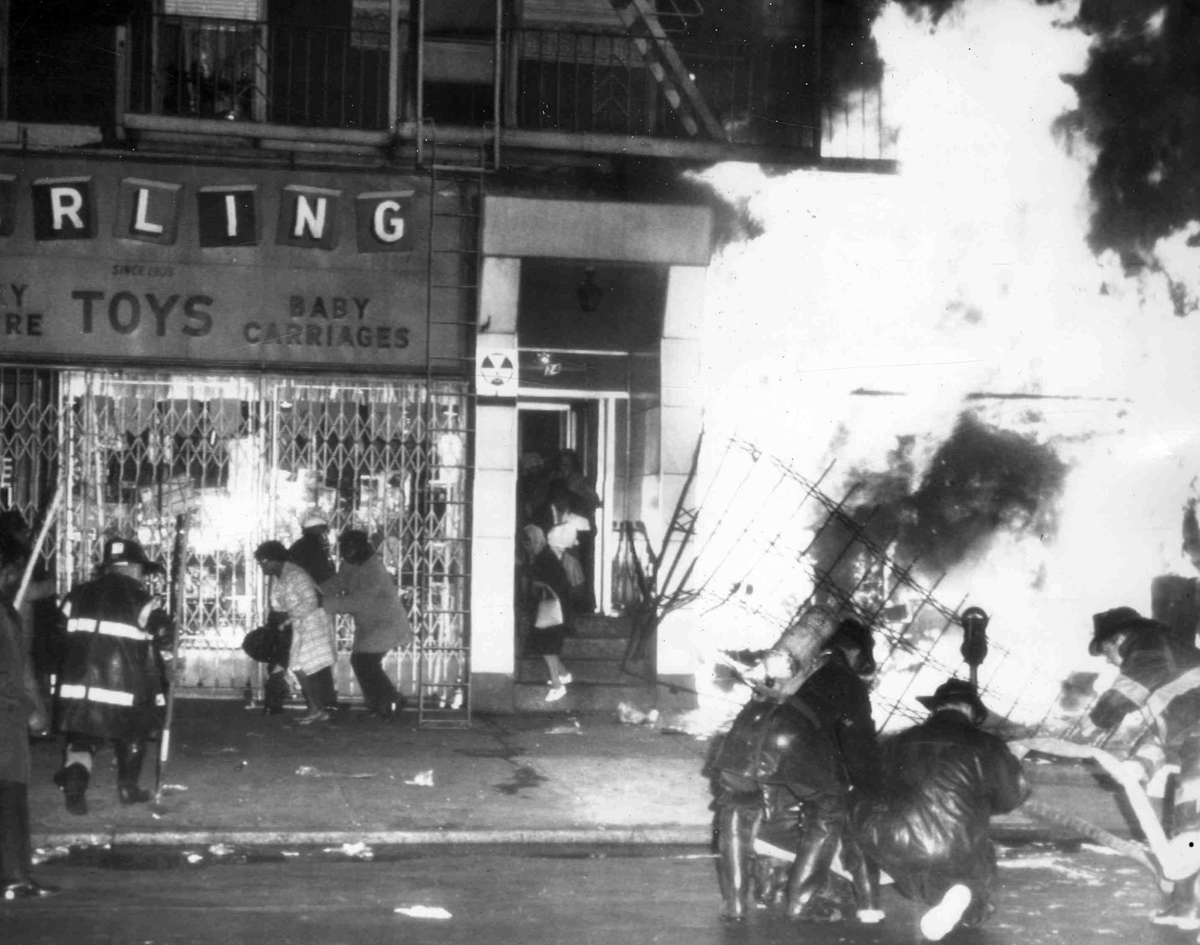

After the Memphis speech, Dr. King was jubilant. He celebrated with his allies. He met A.D. King (his brother), Georgia Davis (or the late Kentucky state senator), and other people. Dr. King wanted to go forward and make another march despite opposition. The next day, he was preparing to eat dinner with colleagues. On April 4, 1968 (at about 6 pm.), one of the most tragic events in American history would happen. Dr. Martin Luther King Jr. was in Memphis and he fought for the right to march without an injunction from the judge. He gathered allies on that day to discuss a future nonviolence march after his previous night’s I Have Been to the Mountaintop speech (which he prophetically said that he may not get to the Promised Land, but black people will get there in the future). He came outside of the balcony of the Lorraine Motel and talked with Jesse Jackson and other people like Andrew Young. Later, he is shot from a rifle to his jaw. He is killed soon afterwards. This changed America and the world forever. 1968 would never be the same. The Memphis sanitation strike would end by April 16, 1968. The strikers had a pay raise and union recognition (which were the two major goals of the movement). T. O. Jones was a leader of that movement who wanted change. T.O. Jones allowed the vote for the union recognition to exist.
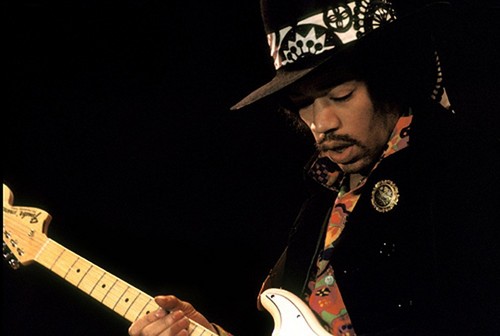

Appendix A: The Music of that Era
By early 1968, music was very diverse. Johnny Cash performed his famous concert at Folsom State Prison in California on January 13, 1968. The Who and the Small Faces began with a tour of Australia and New Zealand on January 20. Simon & Garfunkel released The Graduate album on January 21, 1968. Aretha Franklin released her Lady Soul album on January 22, 1968. This album had classic songs like You Make Me Feel Like a Natural Woman, Chain of Fools, People Get Ready, Groovin, and A’int No Way. Gospel/R&B singer Cissy Houston (mother of Whitney Houston) and her group the Sweet Inspirations are credited as background vocals on several tracks, along with Aretha's sisters Carolyn and Erma Franklin. The Bee Gees on February 4, 1968 made their American television debut on The Smothers Brothers Comedy Hour. On February 12, 1968, Jimi Hendrix is given an honorary high school diploma from Garfield High School in Seattle, Washington. Hendrix is also given the key to the city. On February 16, 1968, Franklin was honored with a day in her honor and was greeted by longtime friend Martin Luther King, Jr. who gave her the SCLC Drum Beat Award for Musicians just two months before his death. On February 16, The Beatles, Mike Love, Mia Farrow, Donovan and others travel to India to visit Maharishi Mahesh Yogi at Rishikesh. This was part of many musicians seeking alternative religious faiths for their quest in finding enlightenment. Many of them rejected the Judeo-Christian views in favor of Hinduism or Transcendental Meditation. On February 21, 1968, McGraw-Hill, Inc., outbids eight other publishers and pays $150,000 for the U.S. rights to Hunter Davies' authorized biography of the Beatles. The great singer Florence Ballard of the Supreme was released from her contract with Motown on February 22, 1968. The doo-wop singer Frankie Lymon was found dead at his grandmother’s house in Harlem, New York City on February 27. He had a heroin overdose. Johnny Cash and June Carter are married in Franklin, Kentucky, with Merle Kilgore as his best man on March 1, 1968. The 58th and final new episode of The Monkees airs on NBC by March 25, 1968. On March 30, 1968, The Yardbirds record their live album Live Yardbirds at the Anderson Theater. From this early period of the year of 1968, people were showing music like Nancy Sinatra, Steppenwolf, John Coltrane, The Velvet Underground, Elvis Presley, The Byrds, and other human beings.
By Timothy
No comments:
Post a Comment